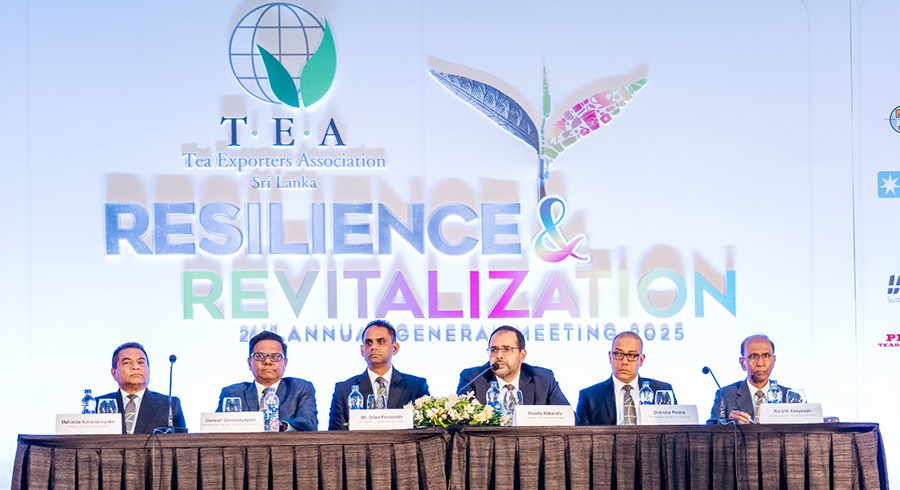Delivering his address, Mr. Huzefa Akbarally, Chairman of TEA, reaffirmed the Association’s commitment to strengthening the global position of Ceylon Tea:
“In 2025, we project tea exports of 270 million kilograms and revenues exceeding USD 1.5 billion, an increase of nearly 10 % from last year.
This growth is a testament to the resilience of our smallholder farmers, who produce 70% of Sri Lanka’s tea.
Yet, smallholder yields have declined, and urgent investment is required in replantation and block-in-filling to secure their future.
With the right support, Ceylon Tea can achieve the government’s target of 400 million kilograms and USD 2.5 billion in export revenue by 2030.”
Gracing the occasion as Chief Guest, Hon. K. V. Samantha Viddyarathna, Minister of Plantation and Community Infrastructure, stressed the importance of collective action:
“Ceylon Tea is not only a proud brand but also a lifeline for our economy.
By 2030, our ambition is to reach record levels of production and exports.
This requires strengthening the foundation of the industry by empowering smallholders, adopting new technologies, and building resilience.
We count on the Tea Exporters Association to help us deliver on this vision for the nation.”
As Guest of Honour, Hon. Sunil Handunneththi, Minister of Industry and Entrepreneurship Development, highlighted the role of exporters in protecting Sri Lanka’s global reputation:
“The name ‘Ceylon Tea’ carries weight worldwide.
To safeguard it, we must move beyond bulk exports and focus on branding, packaging, and value addition.
Fertilizer supply and global competition are critical challenges, but through partnership between government and the private sector, I am confident the industry will achieve its highest returns yet.”
Delivering the Keynote Address, Dr. Martha Tesfaye Woldemichael, IMF Resident Representative for Sri Lanka, drew parallels between the tea industry and the country’s recovery:
“This AGM is not just a business gathering—it is a celebration of resilience.
Like Sri Lanka itself, the tea industry has weathered crisis and is now on a path to revitalization.
More than 90% of Sri Lanka’s tea production is exported, sustaining two million livelihoods.
By embracing sustainability, competitiveness, and innovation, this industry can remain a cornerstone of the country’s economic renewal.”
Commenting on the Sri Lankan economy she said -
Revenue mobilization has improved significantly. International reserves continue to accumulate.
Debt restructuring is well advanced and investor confidence is gradually returning.
Sri Lanka also took major steps to strengthen governance and advance its anti-corruption agenda.
This remarkable turnaround, this remarkable revitalization did not happen by chance.
It is the result of decisive actions by the authorities and the extraordinary resilience of the Sri Lankan people supported by various external partners such as the IMF.
These efforts have been focused on restoring fiscal and debt sustainability, rebuilding external buffers, keeping inflation in check and safeguarding financial stability.
The program also seeks to lay the foundations for strong and inclusive growth by addressing governance weaknesses and protecting the poor and vulnerable through stronger social safety nets.
However, Sri Lanka recovery is still fragile.
The country is operating in a challenging global environment marked by elevated uncertainty due to global trade tensions and geopolitical conflicts.
While the occurrence of external shocks is outside the control of authorities, it is possible to mitigate their impact by strengthening the resilience of the economy.
This is why it is so important to stay the course on reforms.
The government should create an enabling environment for the private sector to invest, expand and create jobs.
This requires sustaining macroeconomic stability through prudent policies, ensuring policy predictability and tackling governance weaknesses.
Investor confidence will gradually improve as Sri Lanka builds a track record of sound policy and reform implementation.
Within this broader private sector narrative, the tea industry holds a special place strengthening its competitiveness, embracing sustainability and capturing more value.






















